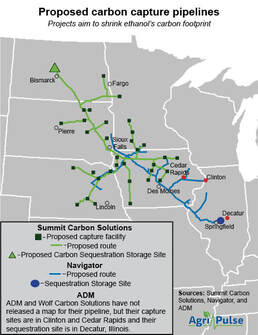News update from Minnesota Public Radio: CO2 Pipelines debate heating up in Minnesota On September 12, Iowa-based Summit Carbon Solutions (Summit) submitted its first route permit application to the Minnesota Public Utilities Commission (PUC) for the Otter Tail and Wilkin Counties section of its proposed multi-state Midwest Carbon Express CO2 pipeline network (PUC Docket Number: 22-422. Summit’s proposed CO2 pipeline network will cut through Chippewa, Cottonwood, Jackson, Kandiyohi, Martin, Otter Tail, Redwood, Renville, Wilkin, and Yellow Medicine Counties. This leg of the project is 28.1 miles, a small fraction of the more than 212 miles of highly pressurized hazardous liquid CO2 pipeline proposed for Minnesota. The PUC ruled in June that they have jurisdiction over the routing of CO2 pipelines. Landowners and community members impacted by the proposed CO2 pipelines in Minnesota are concerned about the safety and negative effects of CO2 pipelines and Summit’s shady tactics as well as being skeptical about the company’s claims that they will be a boon to rural communities. While the conflict over CO2 pipeline construction has grown heated in surrounding states, the debate has been quieter in Minnesota. That seems likely to change as the companies attempt to secure more easements and as the permitting process proceeds. source: email from CURE, Oct 2, 2022, 7:10am
Why are carbon pipelines being proposed? Why are investors and the federal government putting money into these projects? We know that carbon in our atmosphere is causing the earth to warm, which will disrupt our climate and all life on earth. Reducing or eliminating carbon emissions is critical, and there are many different ideas about the best ways to do it. One controversial approach we've been taking for the past two decades is to switch from fossil fuels to 'biofuels' - ethanol and biodiesel. In this post on the UMRR Blog, we reported on a February 2022 report that looks at the utility of ethanol as an option for reducing carbon emissions. The ethanol industry is seeking ways to improve its environmental performance, especially as relates to carbon emissions. One way to do this is to capture the carbon that is released into the atmosphere. The pipelines would move the captured and compressed CO2 to eventual storage and/or reuse. The first two short YouTube videos following provide some more background on why the ethanol industry sees carbon capture as a way forward. The third is a video that provides more information on the process of capturing carbon from industries.
Carbon capture is part of President Biden's climate plan. This link goes to an article in the MIT Review interview with Shuchi Talati, chief of staff at the Department of Energy's Office of Fossil Energy and Carbon Management. Here, Talati talks about the need to have a range of processes for reducing carbon. We have included a number of references at the end of this post that provide more information on pipeline technology and DOE work on carbon capture. Carbon pipelines are currently used in Texas to transport CO2 for use in extracting oil from spent oilfields, there are also links to information on this practice.  Jess Mazour Jess Mazour Jess Mazour bio: Jess is a lifelong Iowan who found her passion in agriculture, local foods and the environment through her non-profit work. She currently works as the Conservation Program Coordinator for the Sierra Club Iowa Chapter where she is working with over one thousand farmers and landowners across the state who are opposing the carbon pipelines. Jess advocates for an intersectional vision of agriculture for the health of our communities, our environment, our citizens and our bodies. Jess has worked with Senator Bernie Sanders to develop his Rural Revitalization Plan and other federal and state leaders to advance good agricultural, rural, and food policies. Additional references:
DOE funding carbon capture infrastructure: https://www.energy.gov/fecm/notice-intent-issue-funding-opportunity-bipartisan-infrastructure-law-carbon-capture DOE program to accelerate carbon capture technology: https://www.energy.gov/fecm/carbon-negative-shot DOE info on pipeline safety: https://www.energy.gov/fecm/articles/statement-doe-welcomes-new-carbon-dioxide-pipeline-safety-measures-announced-us Why capturing carbon is part of Biden's plan: https://www.technologyreview.com/2021/08/25/1032832/why-capturing-carbon-is-an-essential-part-of-bidens-climate-plans/ Discussion of are eminent domain: https://www.reuters.com/business/environment/us-carbon-pipeline-proposals-trigger-backlash-over-potential-land-seizures-2022-02-07/ Agri-Pulse; concerns about yield: https://www.agri-pulse.com/articles/17077-carbon-dioxide-pipelines-unearth-anxiety-in-farm-country Excellent graphic CO2 Pipelines in Texas: https://www.kindermorgan.com/Operations/CO2/Index#:~:text=Kinder%20Morgan%20operates%20the%20approximately,feet%20of%20CO2%20per%20day. DOE; Texas demonstration project: https://www.energy.gov/fecm/articles/texas-co2-capture-demonstration-project-hits-three-million-metric-ton-milestone Comments are closed.
|
| LWV Upper Mississippi River Region | UMRR blog |

 RSS Feed
RSS Feed